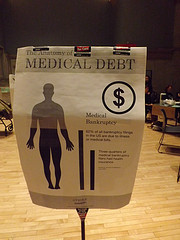I see medical debt on most credit reports that I review. In fact, we show that medical debt is the cause of over half of our individual cases we are pursuing.
Some pointers to resolve your medical debt:
1. Everything is negotiable on your bill. The hospital or doctor maybe able to extend discounts for asking. For smaller doctors groups they may be more willing to extend cash discounts or uninsured discounts. For large medical groups or hospital systems, go to the billing office and ask for the paupers or indigent affidavit. This allows the hospital to determine your portion of the bill. They can charge the remaining balance to the federal government or a medical charity.
2. Payment plans. If you can’t pay the entire balance at once (and many people can’t), work out a payment plan with the doctor or hospital. Be sure the payment plan is affordable for you. keep in mind your current health concerns. Are you going to be able to make the payments if something else happens? Once you have an affordable payment plan in place, get it in writing from the billing office. If you have circumstances arise that will cause you to default, call the billing office first. Work out another payment plan. Do not put yourself on a payment plan without notifying the creditor. There is a myth out there that if you pay just $5 per month they can not report the negative debt to the credit bureaus. They can report any delinquent amount even if you are on a payment plan.
3. Credit reports. If you have recently had a lot of medical bills you may want to sign up for a credit monitoring service to be notified of medical debts being added your credit report. While I have heard that medical debts are a small percentage of items in a credit report, I disagree. They are about 25% to 30% of derogatory information on credit reports. I do agree that you can usually resolve the medical bills with the hospital group before they hit the credit report. The medical bills that usually appear on the credit report tend to be lab tests and individual and specialist doctors such as anesthesiologist. Currently, these usually are the big out of network exceptions most people have.
4. Accurate billing. Review the bill. Are they accurate? If you need help reviewing your bill, the billing office of the hospital often is willing to help explain the bill. Question each of the items listed and ask if that seems correct pricing for that procedure.
5. Collection agency calls and mail. Do not ignore calls and mail. It is usually an opportunity to resolve a debt before it appears on your credit report. Ask for copies of the billing before you pay. If you need to know more about how to handle medical debt collectors you can download a free packet here.
6. Local assistance programs. You may be able to find local organizations that can assist. Below are some links to North Texas counties services.
If you are being harassed by medical debt collectors or want to resolve issues with them, our law firm can be hired to represent you. Call (214) 506-2500 or email cs@txclf.com or visit us online for a free consultation at Medical Debt.





